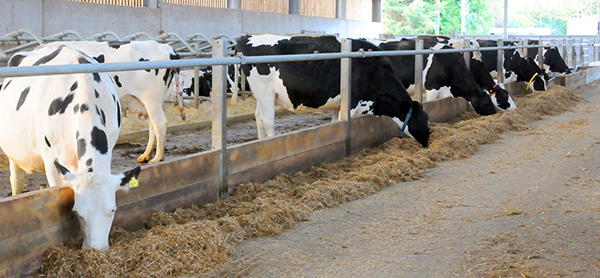The John Oldacre Centre for Dairy Welfare & Sustainability Research

Bristol Vet School has been awarded £1 million by the John Oldacre Foundation to create a new nexus for ruminant research, underpinned by creation of the world’s most intensively monitored dairy farm at our commercial facility. Combining Bristol’s leading expertise in cohort studies, genetic epidemiology, anti-microbial resistance (AMR), sensing and monitoring, data science and artificial intelligence with Bristol Vet School’s leading Sustainability, Welfare and One Health approach to AMR research, this will provide a platform for tackling One Health grand challenges.
Our platform will realise a longitudinal cattle cohort to answer fundamental research questions:
- Global Food Security: Understanding animal resilience to intensified production while ensuring sustainable resource use
- Welfare and Cognition: Studying social/environmental interactions, for high welfare practice and to advance basic cognition and behaviour research
- Disease and resistance dynamics: Transmission modelling between cows and through the environment and farmers
- Health monitoring and Precision Livestock Farming (PLF): A testbed for developing and validating sensors and data integration methods, prior to translation to human health and PLF scenarios
The farm research platform will also be available through our membership of CIEL and Agri-EPI Centre to support R&D supported by our extensive “gold standard” monitoring infrastructure.
Instrumentation includes:
- A comprehensive dense network of video surveillance cameras to track movements and behaviour of all our cattle 24/7 underpinned by the development of novel deep learning artificial intelligence techniques funded by the Alan Turing Institute and the BBSRC (Andrew Dowsey, Tilo Burghardt, Neill Campbell)
- Infrastructure for commercial & research wearables and other Internet-of-Things devices
- Detailed observation biomechanical/biosensor/thermal analysis at specific locations
- Capture of individual cow inputs, metabolic physiology, emissions and veterinary interventions
- Meteorology and environmental monitoring stations
Ongoing work and collaborators include
- Validating the effects of ozonated drinking water (‘Ozone’) generated using novel electrodes. The study aims to record growth rates, disease incidence and cause, and gastrointestinal parasite burdens and antibiotic usage in calves as well as measuring gut microbiome composition (Laura Peachey, Daniel Enqriquez Hidalgo, (Bristol Veterinary School), in collaboration with Peroxigen).
- A behaviour testing arena will provide a resource that can support planned research grants (such as BBSRC) and developing grants by the new AWB appointed lecturer (Benjamin Lecorps).

Bristol expertise addresses dairy industry welfare and productivity research questions relating to infectious diseases, antimicrobial use and resistance (AMR), animal health economics and nutrition.
Dairy researchers at Bristol have access to our diagnostic pathology service, our farm and the Langford Vets Farm Animal Practice. We have a track record in dairy cow welfare research resulting in practice and policy change through social science and communication research. Bristol is developing novel systems to assess cattle behaviour, including using remote monitoring on our farm.

Bristol research has focussed on the productivity and welfare issues of lameness and abortion in sheep. The goat industry is funding a major study into goat health problems which affect productivity.
Our farm animal veterinary practice (Langford Vets), has client farms (mostly small holders/farms raising sheep and goats). Many of these local producers use Bristol's on-site commercial/research abattoir and butchery, providing potential for supply chain research.
